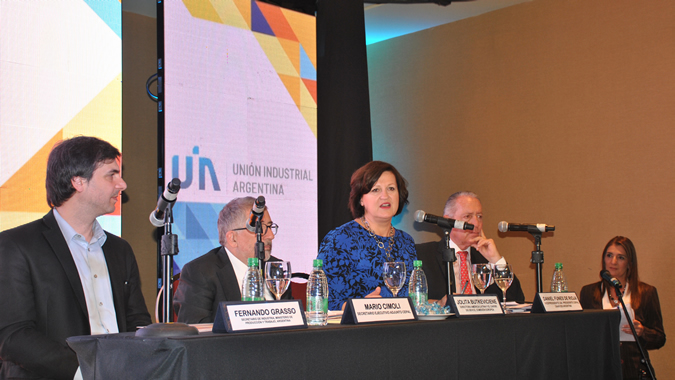New Generation of Industrial Policies is Critical for Development of Micro, Small and Medium-sized Enterprises in Latin America and the Caribbean
Work area(s)
At a high-level seminar in Buenos Aires, authorities and experts debated the challenges of MSMEs in the face of disruptive technology and global uncertainty.

The creation of new industrial policies that promote technological ecosystems is critical to the development of Latin America’s Micro, Small and Medium-sized Enterprises (MSMEs), indicated the authorities, international experts and representatives of the public and private sectors who are participating in the seminar An agenda for MSMEs in the face of disruptive technology, new productive models and trade uncertainty: Good practices in Latin America and the European Union, inaugurated today in Buenos Aires, Argentina.
At the high-level gathering that will run through Thursday, October 11, participants will address the main challenges faced by these companies and the forging of cooperation strategies that help to overcome them. The seminar is being organized by the Economic Commission for Latin America and the Caribbean (ECLAC), the European Union and the Argentine Industrial Union (UIA).
Before a room packed with more than 200 participants, the event was inaugurated by Fernando Grasso, Secretary of Industry at the Ministry of Production and Labor of Argentina; Jolita Butkeviciene, Director for Latin America and the Caribbean of the European Commission’s Directorate-General for International Cooperation and Development (DG DEVCO); Daniel Funes de Rioja, Vice President of the UIA, President of the Coordinator of the Food Product Industry of Argentina (COPAL) and Chair of B20 Argentina (the international business leaders forum for the G20); and, on behalf of ECLAC’s Executive Secretary Alicia Bárcena, the Deputy Executive Secretary of the United Nations regional organization, Mario Cimoli.
Fernando Grasso indicated that physical infrastructure and connectivity are key for MSMEs to be able to develop. He also stressed the role that education plays as a tool that provides the capacity to produce people who foster innovation.
“We are living at a tremendous speed due to the change in the technological paradigm, which has a cross-cutting reach at a production level. From that point of view, it is extremely important that there be an adequate level of infrastructure so that companies can operate in an environment that allows for internalizing this kind of technology, but also that there be policies for outreach that can help the SMEs understand what this revolution is all about,” Grasso said.
Jolita Butkeviciene said, meanwhile, that the MSMEs of Latin America need support to tackle their challenges, since they will not be able to overcome them on their own. “At the EU we want to have a shared vision with Latin America. For us, there is nothing more important than sustainable growth with employment,” underlined the European bloc’s most senior representative for cooperation with Latin America and the Caribbean.
“We need to share technical consulting and learned lessons. We also need a push, we are here to support you, but creativity is fundamental to this. The field for mutual cooperation is wide open and in your hands,” Butkeviciene added.
In his remarks, Daniel Funes de Rioja indicated that Argentina is a country with the right natural and human resources to join this change or technological disruption amid global and local uncertainties. “That is not going to stop us. The velocity of the change is such that, either we join now, or the lags or separation with the developed world will worsen,” he said.
“But we cannot do it alone, there is a need for integration. And that integration must lead us to a model of productive inclusion and to working side by side for sustainable development. As businesspeople, we have reaffirmed our vocation for multilateralism and smart integration,” he added.
ECLAC’s Deputy Executive Secretary, Mario Cimoli, warned that if the gaps in productivity and productive structure are not closed, no inclusion process will be possible for micro, small and medium-sized enterprises.
“A new generation of industrial policies is needed in Latin America and the Caribbean, as has been done in Europe. Our concern is to build policies that promote technological ecosystems, but this must be done in a context of sustainability and within multilateralism. That is critical,” Cimoli sustained.
The two-day seminar, which is part of the activities of the EUROMIPYME project that ECLAC is carrying out with financing from the European Union, seeks to support governments of the region in developing better policies to further MSMEs, which represent approximately 99% of all companies, 61% of jobs and 25% of production in Latin America.
On various panels, the attendees will analyze in particular the accelerated digital innovation that is radically changing business models, productive processes and consumption patterns, a situation that has put at the center of business strategies the capacity to build networks and productive systems that are duly articulated and integrated. There will also be spaces for public-private dialogue to advance on the formulation of new strategic guidelines for designing support measures for MSMEs that account for the changes in the global competitive scenario.
During the event, the publication MSMEs in Latin America: A fragile performance and new challenges for promotion policies (in Spanish only) was also presented. This document, produced by ECLAC with the support of the European Union, analyzes the performance of MSMEs in the region and the policies and institutions that support them.
It indicates that the efforts made by promotional entities have allowed for expanding the regulatory framework and diversifying supportive measures. Nevertheless, these advances are not enough to face the challenges that characterize the current competitive scenario, meaning that it is necessary to propose a profound change in the approach and work modalities of the entities offering support.
Related event
Related content
La MIPYME frente a la disrupción tecnológica e incertidumbre global
Presentación de Mario Cimoli, Secretario Ejecutivo Adjunto de la CEPAL, en el seminario "Una agenda para la MIPYME frente a la disrupción tecnológica, los nuevos modelos productivos y la…
Subregional headquarter(s) and office(s)
Related link(s)
Country(ies)
- Latin America and the Caribbean
Related project(s)
Contact
Public Information Unit
- prensa@cepal.org
- (56 2) 2210 2040

